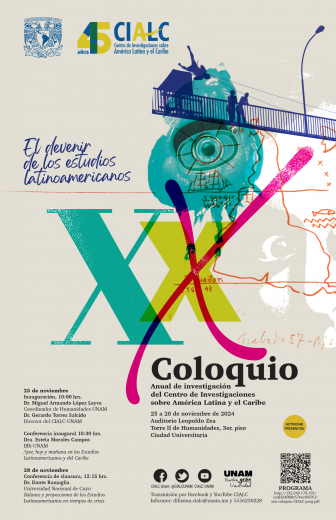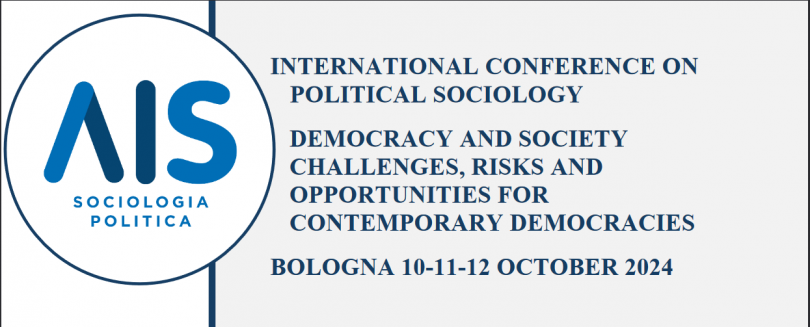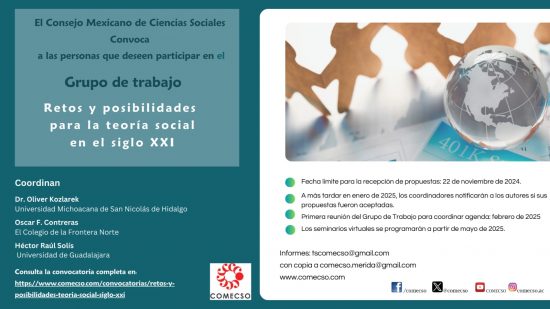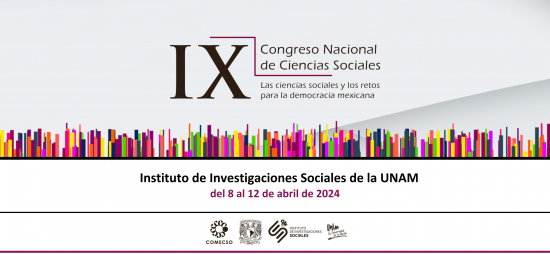Democracy and society challenges
The Political Sociology Section of the Italian Sociological Association (AIS), together with leading international associations of political sociology, is promoting an international conference to discuss the various challenges that social, cultural, economic, political, institutional and geopolitical transformations pose to democracy.
Democracy is an area of study that has belonged to political sociology since its classical authors and raises research questions that are still largely unexplored, both in terms of theoretical elaboration and empirical research. Democracy, its transformations, its crises, its values, its institutions, are the privileged terrain for a socio-political analysis capable of understanding the social and political relations that make up its fabric, especially by studying the visible and invisible dynamics of the conflicts of power and for power that redefine its forms. In its vocation as a science of connections, political sociology repeatedly emphasises that, in studying the relationship between society and politics, one cannot identify politics as an autonomous variable of interpretation, nor, at the same time, diminish the role of politics by focusing on social dynamics alone. Political sociology is not resolved in the mere identification of the social factors that condition the political order, since institutions are themselves social structures, and it is often these that are the independent variables that influence the non-political social structure. Social change and political change thus become the key concepts with which to read the processes of transformation of democracy, in the specificity of a perspective that is not content with describing the forms that have emerged from its crisis, understood as the overcoming of the processes of political representation experienced in liberal democracies. Democracy is a field in constant flux, whose aporias make its study a privileged field for the fundamental questions of social research: how can the individual, society and collective political action be reconciled? How have the structures of inequality changed? What is the relationship between politics and the economy, politics and culture, politics and new forms of religion? What are the forms of social and political relations in advanced modernisation processes? What role does the relationship between society and development, between environment and progress, play in political phenomena? Finally, is democracy still the political project of modernity?
In the process of reconfiguration of global society, whose trajectory coincides with the thirty-year period after 1989, through 9/11, the 2008 crisis, the shock of the Sars-Covid-19 pandemic, the war in Ukraine and the Israeli-Palestinian conflict, we are faced with a scenario in which the capacity of politics, national, supranational and international, is not only weakened in its primacy over the other spheres of society, but also de-synchronised with respect to the ‘facts of society’. The time of democratic politics is slower than the time of social change, just as the space of politics dimensioned at the level of the nation-state is desynchronised with respect to the space of social phenomena. Moreover, we are faced with challenges that place democracy itself in the mirror of its own founding values, not only in the area of choices that affect individual freedom, but also in how it positions itself in the system of international political regulation.
In the public and academic debate, the scenario of the crisis of democracy is recurring more and more often. Post-democracy, defective democracy, post- representative democracy, populist democracy, illiberal democracy: these are the many and varied definitions used to identify the overcoming of the ‘traditional’ paradigm of representative democracy. Similarly, the widespread attempts to conceptualise phenomena that challenge democracies by highlighting a ‘regressive’ profile, as well as the existence of social phenomena that define a ‘cultural backlash’, ‘retrogression’ or ‘retrotopia’, need to be considered in the light of a new political sociology of democracy.
The crisis of legitimacy of traditional political subjects occurs when the balance that holds together the sense of pursuing a common project, the strengthening of the power of the political class, the attainment of ideal or socio-economic interests by citizens/voters, depending on the structure of community action whose influence they seek, breaks down. The perception of a loss of status, the feeling of relative deprivation, the fear of the loss of social guarantees and protection, the perception of a reduction in opportunities for upward social mobility, insecurity as a sense of socio-economic precariousness, the questioning of one’s own life model, create the conditions for a crisis of legitimacy for the institutional actors of democratic representation. However, it is not only a question of identifying anti- establishment and populist challenges to liberal democracy, but also of shedding light on all the pervasive forms of manipulation of power. On the one hand, the processes of depoliticisation that fuel the crisis of legitimacy of democracy need to be analysed in the context of the impact of neoliberalism on advanced democracies, from the TINA (There is No Alternative) paradigm of political regulation in the 1980s to analyses of authoritarian managerialism and forms of technocratic populism (which reverses representation and legitimacy, not just replacing politicians with technicians). On the other hand, political sociology needs to re-thematise the forms of democratic innovation, from the contribution of the reflexive citizen, the paradigms of sub-politics and life-politics, the perspective of participatory and deliberative democracy, to the new forms of mobilisation emerging from the environmental and feminist movements. What opportunities, what risks, what processes of redefining not only the forms of democratic political conflict, but also the regeneration of the democratic project itself, emerge from these processes? What processes of repoliticisation of democracies are possible in societies of advanced modernity?
Finally, political sociology cannot fail to consider that democracies are also actors that operate as states within the complex web of the international political scenario. As such, democracies themselves participate in the dynamics of the exercise and manipulation of power, just as they become the object of analysis in the behaviour they adopt in relation to the political, economic and military conflicts in which they participate.
The conference will therefore focus on areas closely related to the nature, forms, challenges and developments of democracy.
The following thematic areas form the basis for the submission of paper proposals:
- 1. Democracy and social change: the impact of globalisation, economic crises, financial crises, changing social bases of democracy in terms of social stratification and new and old inequalities, social innovation processes.
- 2. Democracy and socio-cultural change: the processes of individualisation and singularisation, the new ruptures that politicise values, expectations, identities and redefine the belief system on which processes of recognition and political conflict are articulated.
- 3. Democracy and institutional change: the institutional challenges posed by the redefinition of the powers of the nation-state, the process of European integration, as well as the challenges faced by institutions in the processes of public policy regulation, the phenomenon of lawfare, the nature of the relationship between bureaucracy and politics.
- 4. Democracy and geopolitical change: the impact on democracies of the redefinition of international politics, the relationship between war and politics, the dynamics of conflict management and the whole structure of international relations from a socio-political perspective.
- 5. Democracy and changing political representation: changing political actors and forms of political conflict in democracies, the transformation of parties, the relevance of leaders, the problems of political representation.
- 6. Democratic innovation: forms of democratic innovation, digital democracy, the role of platform democracy, participatory democracy, deliberative democracy.
- 7. Democracy and new social conflicts: the new challenges of political ecology, the intersectional perspective promoted by feminist movements, the contribution of student movements, labour movements, peace movements.
- 8. Democracy and socio-political theory: prospects for the development of a new socio-political theory of democracy, new forms of critical political sociology, the public role of political sociology, the intersection between political sociology and cultural processes, social theory and democratic theory.
In this sense, it is a matter of recognising and reknitting the thread of the relationship between society and politics with the critical perspective of political sociology, which encompasses and goes beyond the boundaries of the search for the quality of the form of government and is not limited to the classificatory dimension of the political regime, It is not limited to the classificatory dimension of the political regime, to its constitutional rules of operation, nor to the elaboration of an ideology of democracy, but is interested in the process by which it is simultaneously realised, transformed, maintained and regenerated, as well as in the processes of its possible manipulation.
ABSTRACT AND DEADLINE
- Abstracts of proposals must be received by 30 May 2024.
The abstract must include the title of the paper, the name of the authors (and the name of the corresponding author), the university, a text of max. 3,000 characters including spaces (approx. 450 words) and an indication of the thematic area in which the proposal will be presented. - E-mail address for sending the abstract: sociologiapolitica@ais-sociologia.it
- Acceptance or rejection of abstracts will be confirmed by 15 June.
- Submission of the paper, also in draft form, is required by 15 September.
Scientific Board
Antonella Coco, Marco Damiani, Fabio de Nardis, Maria Cristina Marchetti, Luca Massidda, Milena Meo, Maria Mirabelli, Dario Tuorto (local office), Cristiano Vezzoni, Lorenzo Viviani.
International Scientific Board
ESA (European Sociological Association) RN32 Political Sociology; ISA (International Sociological Association) RC18 Political Sociology, RC26 Sociotechnics – Sociological Practice; ECPR (European Consortium for Political Research) SG Political Sociology; AFS (Association Française de Sociologie) RT34 Sociologie politique; DGS (Deutsche Gesellschaft für Soziologie) Section Politische Soziologie.
Te puede interesar

Retos y posibilidades para la teoría social en el siglo XXI
comecso - Nov 20, 2024El Consejo Mexicano de Ciencias Sociales, A.C. Convoca a las personas que deseen participar en el Grupo de Trabajo Retos…

Coloquio anual de investigación del CIALC
Laura Gutiérrez - Nov 22, 2024Centro de Investigaciones sobre América Latina y el Caribe El devenir de los estudios latinoamericanos Coloquio anual de investigación del…

Imaginar futuros justos en la transición energética
Laura Gutiérrez - Nov 22, 2024La Cátedra UNESCO en Estudios del Futuro de la Universidad Autónoma Metropolitana, Unidad Cuajimalpa, en el marco de los trabajos…

Grupo de Trabajo El humor, la risa y las jerarquías
comecso - Nov 22, 2024Grupo de Trabajo El humor, la risa y las jerarquías Coords. Dr. Jorge Cadena-Roa y Dr. Mitl Maqueda Silva Ciclo…












